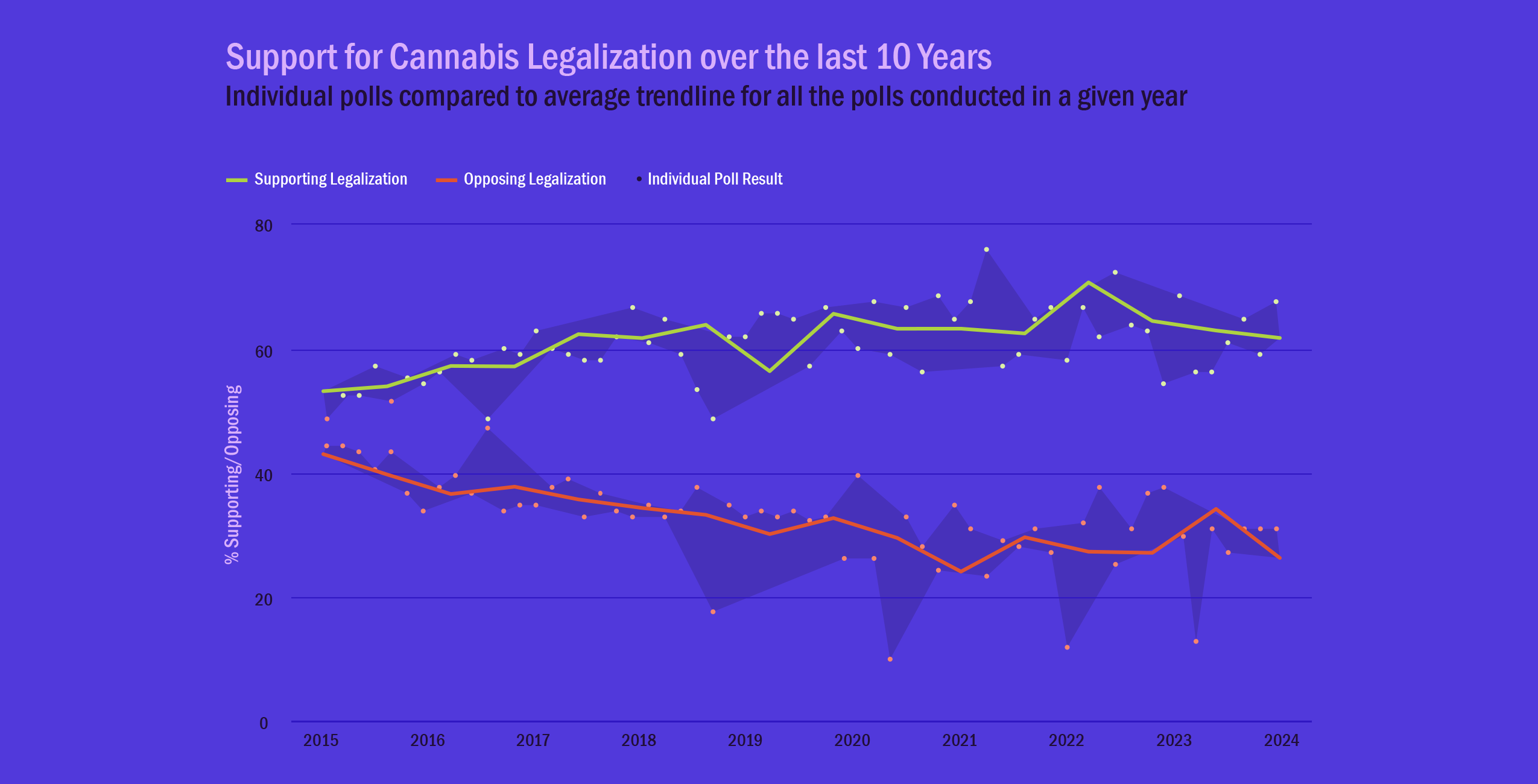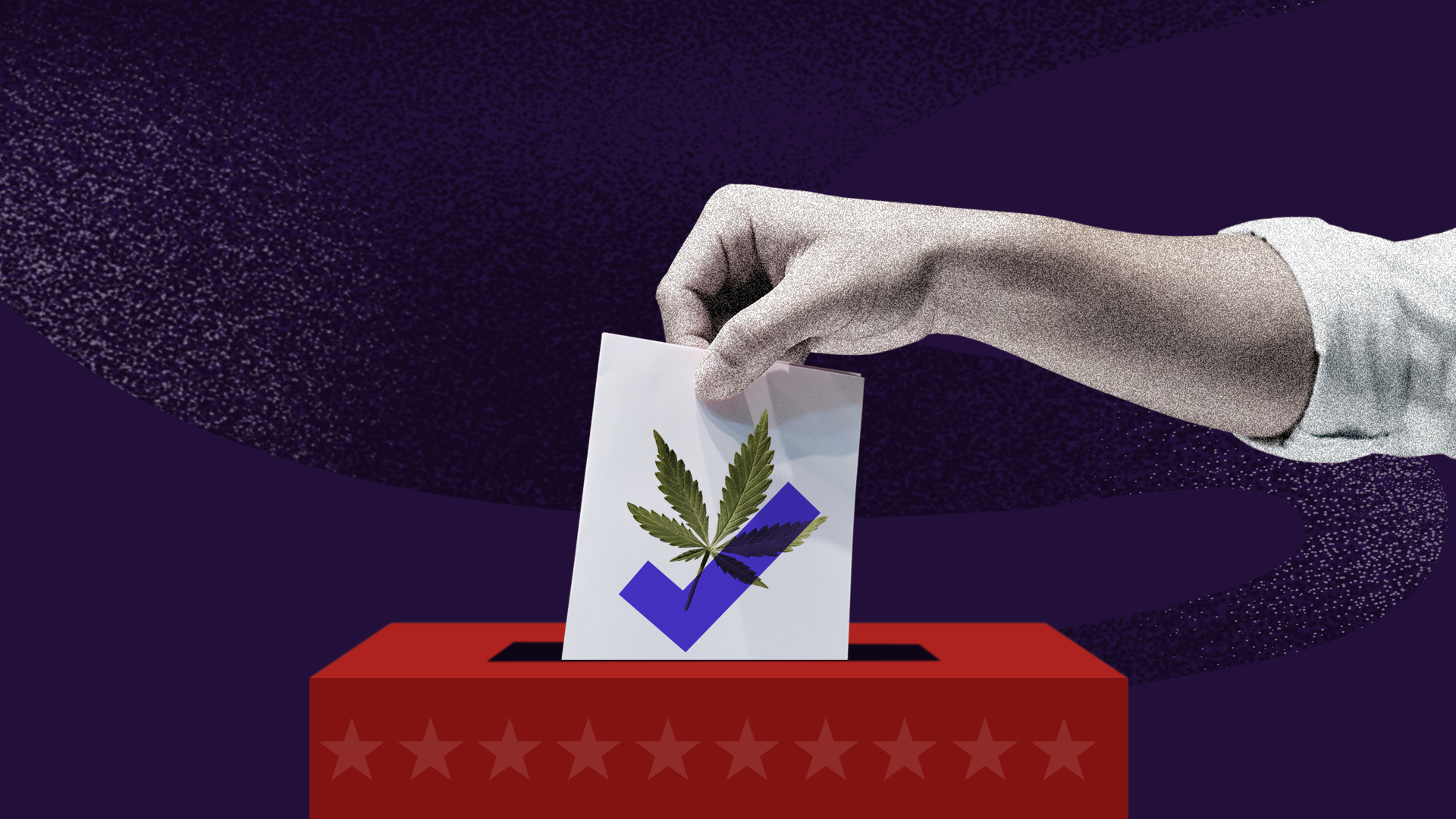If you want to find out how many people in the US support legalizing cannabis nationwide, you’ll find a seemingly endless stream of polls purporting to have the answer. But as most people know – especially with a presidential election on the horizon – any one poll doesn’t necessarily give a reliable answer to a particular question. One poll will tell you 60% support legalizing weed, while the other will put it at closer to 50%. So how do you deal with this inherent uncertainty?
Simply put, you don’t focus on one poll, but all of the polls. By combining the results from many specific polls into a single result, you effectively reduce the bias in any one result and come to a more reasonable conclusion about the overall issue.
So with that in mind, how many Americans support legalizing cannabis nationwide? Do things like age and political affiliation affect the answer? And what about states like Florida with a cannabis legalization ballot coming up – is it likely to pass?
We’ve analyzed the results from 70 individual polls to answer some of the key questions about the fight for cannabis legalization in the US. Here’s what we found.
Read the summary of the report below, or download the full report here (PDF).
Key Takeaways
- Support for cannabis legalization has increased over the last 10 years, from 53% in 2015 to 62% in mid-2024, peaking at 71% in the first half of 2022.
- Democrats, independents, and younger adults (under 45) are more likely to support legalization than Republicans and older adults.
- Florida’s recreational legalization ballot initiative in November is likely to be a close call. Polling from 2024 altogether suggests it will fail, at 57% support (short of the 60% needed). However, the most recent polling from June suggests it will pass.
- The recreational cannabis ballot measure in North Dakota is not likely to pass based on polling conducted to date, but the one in South Dakota could go either way.
- If Nebraska’s medical marijuana ballot initiative is approved, the only poll from 2024 suggests it will pass comfortably.
The National Picture: How Many Americans Think Cannabis Should Be Legalized?
The core question we investigated was: should cannabis be legalized in the US?
We looked at data spanning roughly a decade, from 2015 to June 2024, splitting each year into two for data analysis, with the exception of 2015, 2020, and 2023, which had fewer polls overall that were all analyzed annually.
Overall, the results show that aside from a notable spike in early 2022, support for cannabis legalization gradually increased over the past decade, with some signs it may settle down at somewhere between 60% and 65%. The most recent result, for all 2024 polls conducted to date, shows support at 62%.

There were a few outliers to this overall trend. In late 2018 and early 2019, support briefly declined to around 56%, after having risen for several years beforehand, while in late 2019 it reached 66%. The biggest outlier was in 2022, where the pooled result reached 71%, likely owing to a SICPA/Harris Poll of 2,069 US adults showing 78% support for national legalization.
While the current 62% support for legalization is obviously a positive thing overall, it may seem concerning that support has apparently declined since 2022. It could be that after the pandemic boon for the cannabis industry, we’re settling back into the norm of around three-fifths of voters supporting legal cannabis nationwide.
But the overarching trend is still an increase, and there have been spikes and declines in the past (e.g. the spike in late 2019 followed by a two-year slump) but the overall trend has remained. Support will likely continue to increase in the future, but only time will tell for sure.
Democrats Are More Likely Than Republicans to Support Legalization
As you’ve probably noticed if you’ve been following this issue, there is a clear party-political divide when it comes to cannabis.
We looked into this for 2024, and the result is pretty stark and in the direction you’d expect.
- Democrats, on the whole, are more supportive of legalization. Based on four polls from 2024, 71.4% of Democrats support the legalization of cannabis at the national level.
- Independents are more in line with the overall national viewpoint, with 63.5% supporting legalization based on the 2024 polls.
- Republicans are the least supportive of cannabis legalization, with 47.6% supporting legalization.
It’s notable that almost half of Republicans support legalization, given that it’s typically seen as a Democrat policy.
This is also a reminder of the importance of looking at more than just a single poll, because a Data for Progress poll from April 2024 put overall Republican support at 54%. For advocates, it would be tempting to point to this number and say that there’s bipartisan support for legalization, but looking at all of the results shows it’s not quite so clear-cut.
Younger Americans Are More Likely to Support Legalization
Likewise, there appears to be a generational divide when it comes to support for legalization, although this is not as big a difference as you may expect.
Three polls from 2024 had enough information on the age breakdown of responses to allow us to investigate this question.
- For those aged under 45, support for cannabis legalization sits at around 66.4%.
- For people aged over 45, support is slightly lower, at 60%.
It’s notable that even older Americans are supportive of legalization. While this can’t come from the polling alone, it’s possible that widespread medical marijuana programs have had a substantial impact on older adults who otherwise wouldn’t have tried cannabis. But in fairness, it’s also hard to imagine the Woodstock generation having too negative a view of weed.
Other Demographics Showed No Differences
We also looked at the 2024 results broken down by race and gender, but none of these comparisons showed any significant differences. Based on the combined poll results, we found:
- 61.2% of men vs. 60.7% of women support cannabis legalization in 2024.
- 60.8% of white people vs. 63% of black/African American people vs. 63.8% of Hispanic/Latino/Latina people support legalization in 2024.
Statistically, looking at the original polls, there is no significant difference between groups in either of these cases. In fact, based on the limited original poll data the only significant differences were by political affiliation.
States to Watch in 2024: Florida

Several states are debating whether to join around half of the country in legalizing cannabis for recreational purposes, and the most prominent of these is Florida. There is a ballot initiative up for a public vote in November, and many pollsters have looked at voters’ views in the state.
For 2024, there have been a total of five polls covering voters’ views on Florida legalizing cannabis, and there were three others in 2023 that can give insight into how things have been developing.
Based on all of the polls conducted in 2024 to date, overall support for the legalization measure in Florida sits at 56.8%. This is not as positive as it may seem, because ballot measures in Florida require a 60% “yes” vote to pass.
In 2023, voters appeared more positive about the prospect. In fact, based on the three polls conducted in Florida that year, 65.6% of voters were supportive of legalizing cannabis in the state. From the above, it’s clear that this is broadly in line with the national trend of declining support for legal cannabis relative to the high point of 2022.
However, when you dig deeper into the specific polls, there are promising signs. While the three polls conducted in April and May show support at under the 60% threshold, the two conducted in June found 66% and 64% of voters in favor of the measure. Firstly, this is more in line with the 2023 results, and more importantly, it could represent the impact of the heating up of campaigns in the lead-up to the vote.
Overall, using the polls taken up until July 2024, it appears that cannabis legalization has a good chance of success in Florida this year.
States to Watch in 2024: South Dakota
Voters in South Dakota have submitted signatures in support of a ballot initiative to legalize cannabis in the state. Provided that the signatures are validated by August, the measure will appear on the ballot in November.
Unfortunately, polling in South Dakota hasn’t been as extensive as in Florida, and there is only one poll from 2024 so far. This is of just 500 registered voters, and the margin of error is +/- 4.5%, but it shows that only 41.6% of voters support the measure. However, with 6.6% undecided, a small sample, and a pretty substantial margin of error, this is far from conclusive.
There were two polls conducted in 2023, and combining these results as above puts support last year at 47%. These polls were also larger, with 782 and 747 participants. However, as we’ve discussed, support for legalizing cannabis seems to have declined slightly over the past year, so again this doesn’t offer any clear answers.
States to Watch in 2024: North Dakota
After a campaign by New Economic Frontier, a ballot initiative has been submitted in North Dakota for the legalization of cannabis and it’s likely to appear on the ballot in November.
Unfortunately, there is only limited polling available for North Dakota, with just one poll so far in 2024. This is a small poll conducted by Public Opinion Strategies, with just 500 likely voters participating and a margin of error of 4.4%. However, it shows that only 43% support legalization while 57% oppose it.
If the measure is approved for the ballot, there will probably be more polling of North Dakota residents in the coming months.
States to Watch in 2024: Nebraska
Nebraskans for Medical Marijuana submitted signatures in early July in an attempt to get a medical marijuana legalization initiative on the ballot in November.
However, there has only been one poll from 2024 to date, and this found that 70% of likely voters in Nebraska wanted to legalize medical marijuana in Nebraska. It was a pretty big poll, with 2,198 participants and a margin of error of 2.1%. According to Nebraskans for Medical Marijuana, their 2022 poll found that 80% of registered voters were in favor of the change.
Overall, based on the most recent poll, it’s likely that this measure will pass if it makes it to the ballot in November.
Conclusion – Support for Cannabis May Be Declining, But Remains Strong
Based on the polling we’ve analyzed for this research, it appears that support for cannabis legalization is declining slightly from a high point in 2022.
However, this likely isn’t a long-term trend that we should be getting worried about – if anything, the trend is towards increasing support. With cannabis legalization becoming a reality in many states in recent years, it makes sense that opinions would shift, ebbing and flowing year to year.
The most important point is that even with a decline over the past couple of years, a strong majority of Americans support the legalization of cannabis for recreational use. The longer-term trend remains one of increasing acceptance, and as in Florida, where initial signs were negative but recent polls show an upward trend, when voters actually have a decision to make, things can change.
The tired old prohibitionist arguments fall flat, while ordinary Americans arguing for freedom and shining the spotlight on the decades-long failures of the war on drugs have the power to change minds.
You can download the full report in PDF here.
Methodology: How We Analyzed the Polls
We analyzed the polls using Monte Carlo simulations, commonly used in election forecasting, which generates many simulated results based on the mean and statistical variation from each poll. The method basically creates a distribution of possible results from each poll, and then combines all of these results (from multiple runs of multiple polls) to enable everything to be analyzed together. In short, we:
- Identified appropriate polls: We found polls that asked participants whether they think cannabis should be legalized (nationwide, or in-state for the state-specific results), provided they were representative of the population and ideally had more than 800 participants (but this wasn’t possible for some state-level polling).
- Simulated 1,000 runs of each poll: We used a Python function to simulate 1,000 normally-distributed results from each poll and its margin of error, preserving the mean and the distribution of results.
- Combined results from polls within a six-month period: Since support for legalization varies over time, we only combined results within a six-month time-span. In some cases (2015, 2020 and 2023) there weren’t sufficient polls in each half-year period to perform the analysis and the whole year was analyzed together.
- Report results from the combined polls: We then took the mean of each of these six-month (or year-long) time periods to present an overall result from the period. For 2024, we also performed demographic analyses to show how the results differed with political affiliation, age, race and gender.
There is more information about how we analyzed the polls in our PDF version of the analysis.

